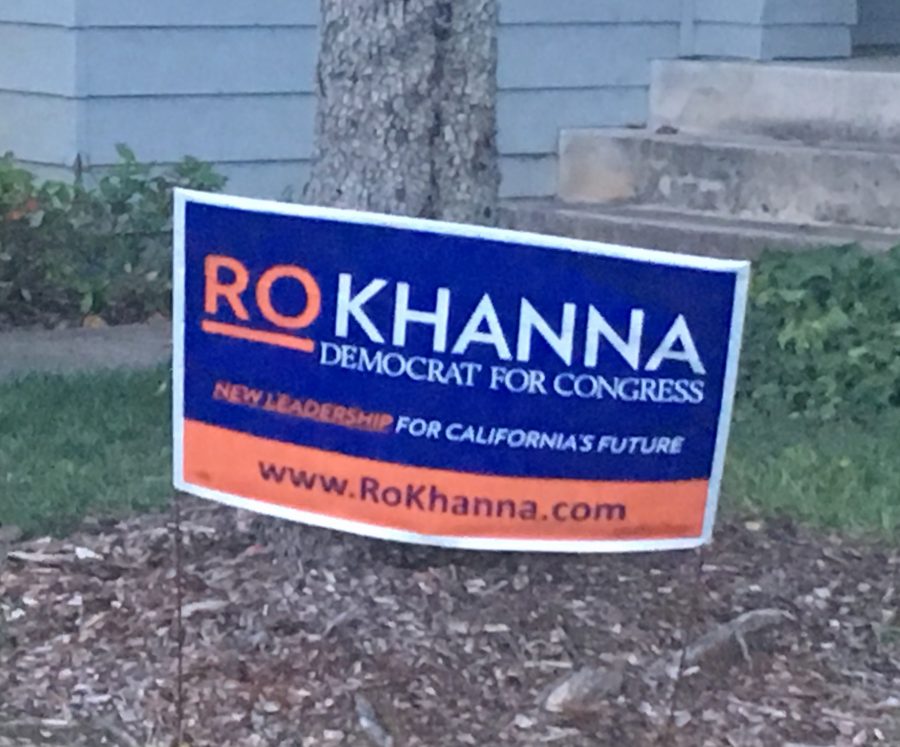Capitol Hill: What You Missed (Volume 18, Issue 3)
Signs supporting candidate for California’s 17th congressional district Ro Khanna were put up in San Jose. Khanna won against incumbent Mike Honda and replaced Honda’s seat in the House of Representatives.
November 16, 2016
Besides the presidential elections, a lesser-known political race on Election Day this year was the election of the Representative of California’s 17th congressional district.
California uses a nonpartisan blanket primary, also known as a top-two primary, to elect representatives and senators. This means that all candidates run against each other in the primary no matter their parties, and the top two finishers proceed to the general election.
This year, Mike Honda, incumbent since 2001, and Ro Khanna, who ran against and narrowly lost to Honda in 2014, advanced to the general election for representative of the 17th district, which encompasses most of Silicon Valley. At the time this article went to press, the winner was not yet determined.
Khanna lost by 3.6 percent to Honda in 2014 and garnered more votes than Honda in the primary this year.
“The thing about Ro Khanna that I like is he’s extremely qualified, and he seems to be working for the people,” said Alycia Cary (10), a canvasser for Khanna’s campaign. “His grassroots movement really seeks to get major community outreach. He offers a lot of internship opportunities for high school students my age.”
Proponents for Honda often cite his long past in Congress, as Khanna has never held a position in the House of Representatives.
“The biggest differentiator is that [Honda] has actually served in Congress. He actually has a track record of legislative accomplishments and legislative priorities,“ said Vedant Patel, the communications director at Honda for Congress. “He’s been an incredibly effective legislator and has a track record of getting things done even in the face of Republican obstructionism.”
Although both Honda and Khanna are Democratic, elections for the House of Representatives in more contested districts could influence which party has control of Congress.
Congressional control is especially important this election cycle because it could influence the selection of the ninth Supreme Court justice after the death of Antonin Scalia. A majority of the Senate must approve the president’s choice for a new justice after the justice is approved by the 20-member Senate Judiciary Committee.
The Republican Party will control the House until January 2017, when the newly elected members this Election Day will be sworn in. The Democratic Party controls 39 of 53 Californian House seats until then.
Voters also elected one of two California senators on Nov. 8, following the retirement of junior senator Barbara Boxer of the Democratic Party. The senior senator, Democratic Dianne Feinstein, will remain in office.
Senatorial elections in California use the same procedures as representative elections. State attorney general Kamala Harris and Orange County Rep. Loretta Sanchez, both Democratic, advanced to the general election after the primary on June 7. The candidates debated on Oct. 5.
“I think people should also understand that it’s their senators and their representatives that they elect to Congress who are going to have more of a say in what happens in their district, because they control a much smaller portion of the country, and they affect much more of what happens in our daily lives,” Alycia said.
Also at stake on Election Day were Propositions 51 through 67, referendums and initiative measures that could lead to actions altering the Constitution of California. California is the only state that uses such ballot propositions.
One controversial bill was Proposition 64, which, if ratified, would legalize marijuana for people 21 or older and establish laws and taxes on the cultivation and sale of marijuana.
The proposition would allow people over the age of 21 to smoke marijuana in their private homes as well as in businesses that are licensed for on-site marijuana consumption. The bill would not allow people to smoke marijuana in public places or while driving. It also places laws and regulations on the cultivation and possession of marijuana.
According to Patel, Honda supports Proposition 64. Khanna has not publicly stated his stance on drug issues.
Sanchez has considered implementing a “pilot program” for marijuana reform in California, and Harris said in their debate that Proposition 64 will likely pass.
Although they may not garner as much of a spotlight as the presidential election, local political elections also often prove important, in ways we may least expect.
This piece was originally published in the pages of The Winged Post on November 16, 2016.


















![“[Building nerf blasters] became this outlet of creativity for me that hasn't been matched by anything else. The process [of] making a build complete to your desire is such a painstakingly difficult process, but I've had to learn from [the skills needed from] soldering to proper painting. There's so many different options for everything, if you think about it, it exists. The best part is [that] if it doesn't exist, you can build it yourself," Ishaan Parate said.](https://harkeraquila.com/wp-content/uploads/2022/08/DSC_8149-900x604.jpg)




![“When I came into high school, I was ready to be a follower. But DECA was a game changer for me. It helped me overcome my fear of public speaking, and it's played such a major role in who I've become today. To be able to successfully lead a chapter of 150 students, an officer team and be one of the upperclassmen I once really admired is something I'm [really] proud of,” Anvitha Tummala ('21) said.](https://harkeraquila.com/wp-content/uploads/2021/07/Screen-Shot-2021-07-25-at-9.50.05-AM-900x594.png)







![“I think getting up in the morning and having a sense of purpose [is exciting]. I think without a certain amount of drive, life is kind of obsolete and mundane, and I think having that every single day is what makes each day unique and kind of makes life exciting,” Neymika Jain (12) said.](https://harkeraquila.com/wp-content/uploads/2017/06/Screen-Shot-2017-06-03-at-4.54.16-PM.png)








![“My slogan is ‘slow feet, don’t eat, and I’m hungry.’ You need to run fast to get where you are–you aren't going to get those championships if you aren't fast,” Angel Cervantes (12) said. “I want to do well in school on my tests and in track and win championships for my team. I live by that, [and] I can do that anywhere: in the classroom or on the field.”](https://harkeraquila.com/wp-content/uploads/2018/06/DSC5146-900x601.jpg)
![“[Volleyball has] taught me how to fall correctly, and another thing it taught is that you don’t have to be the best at something to be good at it. If you just hit the ball in a smart way, then it still scores points and you’re good at it. You could be a background player and still make a much bigger impact on the team than you would think,” Anya Gert (’20) said.](https://harkeraquila.com/wp-content/uploads/2020/06/AnnaGert_JinTuan_HoHPhotoEdited-600x900.jpeg)

![“I'm not nearly there yet, but [my confidence has] definitely been getting better since I was pretty shy and timid coming into Harker my freshman year. I know that there's a lot of people that are really confident in what they do, and I really admire them. Everyone's so driven and that has really pushed me to kind of try to find my own place in high school and be more confident,” Alyssa Huang (’20) said.](https://harkeraquila.com/wp-content/uploads/2020/06/AlyssaHuang_EmilyChen_HoHPhoto-900x749.jpeg)








